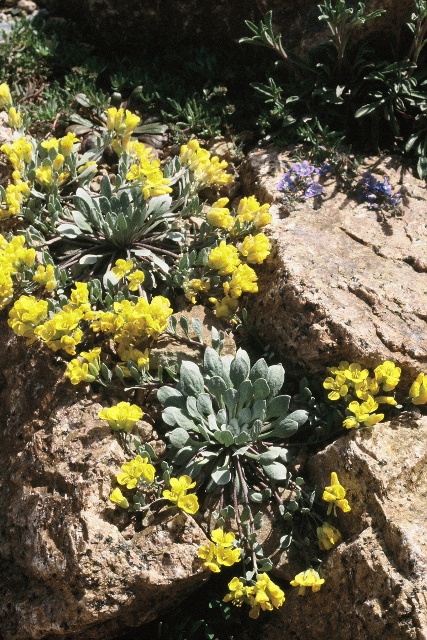Only named in 1981, Physaria alpina is the queen of Colorado physarias. This shows it in a garden setting where it can last three or four years. The flowers are a really lovely deep yellow-orange, and the seed pods decorative. I think there is an alpine species in the Pacific Northwest...otherwise these are mostly plants of desert/steppe and montane screes.


Comments
Trond Hoy
Re: Alpine physaria
Mon, 03/22/2010 - 3:10pmPhysaria is a genus I have never heard of! I have to mend that.
Mark McDonough
Re: Alpine physaria
Wed, 03/24/2010 - 11:08amToday I received seed of Physaria alpine in the NARGS Surplus Seed distribution, yay!
Did some armchair botanizing looking for these photogenic little beauties, often more interesting when fruited up than in flower, although many are nice in flower too. Sit down a spell, put some cozy slippers on, and take a physaria stroll:
Physaria alpina:
http://www.forestryimages.org/images/768x512/1363346.jpg
http://www.forestryimages.org/images/768x512/1363347.jpg
Physaria in Colorado photo gallery:
In particular, look at P. congesta, pulvinata, alpina, floribunda, rollinsii, and pods on scrotiformis and acutifolia.
http://www.conps.org/Slide%20Shows/Physaria%20of%20Colorado/index.htm
North American - Physaria species distribution maps:
http://plants.usda.gov/java/profile?symbol=PHYSA2
Physaria alpina map:
http://plants.usda.gov/java/profile?symbol=PHAL10
Physaria dornii, Nevada, photo of plant in fruit, rosettes almost look sempervivum-like!
http://plants.usda.gov/java/largeImage?imageID=phdo4_002_ahp.tif
Physaria chambersii, Nevada, photo of plant in fruit
http://plants.usda.gov/java/largeImage?imageID=phch2_001_ahp.tif
...and in flower:
http://plants.usda.gov/java/largeImage?imageID=phch2_004_ahp.tif
Trond Hoy
Re: Alpine physaria
Wed, 03/24/2010 - 11:39amYou didn't mention a glass of red wine?
Thanks a lot! I like the leaves too not only the seedpods and flowers. Have to try some next year. Now I have reached my capacity of space and time.
Mikkelsen (not verified)
Re: Alpine physaria
Wed, 01/19/2011 - 6:19amI ordered and planted 40 Physaria alpina from ALPLAINS in 2010
and got 80% germination. Can't wait to see the flowers this year!
Jennifer Wainwr...
Re: Alpine physaria
Wed, 01/19/2011 - 8:12amI didn't recognize the name Physaria but it looked similar to Lesquerella so I did some research and discovered that Lesquerella has been submerged into Physaria.
http://www.jstor.org/pss/3393073
The Physaria(Lesquerella) alpina which I grow is very lanky when in flower, most probably because I grow it under glass. But the pictures on the site posted by Mark shows some really desirable species with attractive seed pods. In particular P. acutifolia.
Mark McDonough
Re: Alpine physaria
Wed, 01/19/2011 - 9:20amJenny, I hadn't really paid attention to the taxonomy of the group, and yes indeed, Flora of North America (FNA), Lesquerella is no more, most species now assigned to the very closely related Physaria, and 8 species spun off into the genus Paysonia.
Note to Peter George: relabel the Lequerella arizonica I gave you to Physaria arizonica.
http://www.efloras.org/object_page.aspx?object_id=114362&flora_id=1
Physaria in Flora of North America
http://www.efloras.org/florataxon.aspx?flora_id=1&taxon_id=125289
Paysonia in Flora of North America (8 previous Lesquerella sp.)
http://www.efloras.org/florataxon.aspx?flora_id=1&taxon_id=316467
Remember however, web sites and other published information is not so quick to adopt name changes, so if you want to see images of what-were-previously-Lesquerella-species on the CalPhotos site, you'll still need to plugin in the name "Lesquerella".
http://calphotos.berkeley.edu/cgi/img_query?query_src=photos_index&where-lifeform=any&rel-taxon=contains&where-taxon=lesquerella&rel-namesoup=matchphrase&where-namesoup=&rel-location=matchphrase&where-location=&rel-county=eq&where-county=any&rel-state=eq&where-state=any&rel-country=eq&where-country=any&where-collectn=any&rel-photographer=contains&where-photographer=&rel-kwid=equals&where-kwid=&max_rows=24
Panayoti Kelaidis
Re: Alpine physaria
Thu, 02/03/2011 - 5:28amSome botanists have tried to drive a stake through the heart of Zauschneria, Dodecatheon and Douglasia, but those genera keep gasping along (albeit bleeding liberally in scarlet and magenta hues)...
The Physaria are such a distinctive and cohesive group it is a pity to drown them in their own generic along with the wispier and invariably more linear leaved Lesquerellas. But lumpers must be lumpers and the DNA shufflers have to prove their worth.
Harrrruummmmph!
Toole (not verified)
Re: Alpine physaria
Mon, 10/31/2011 - 12:48amSeed sown as Physaria ,(Lesquerella),artica in January of this year -- an added bonus will be it's inflated bladder like seed pods later.
Foliage is not as tight as the images I've seen on the web and the flowering stems are longer ??--obviously needs more sun.......
Cheers Dave.
Panayoti Kelaidis
Re: Alpine physaria
Thu, 12/22/2011 - 6:41pmVery cool plant: Lesquerellas have been lumped into Physaria, but I ignore that.
Never seen one quite like your's. Love it!